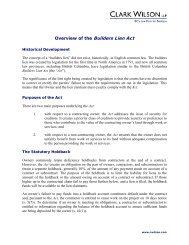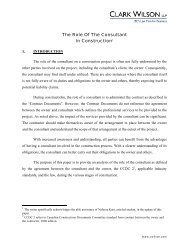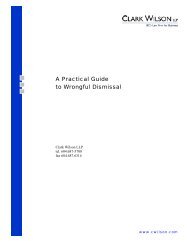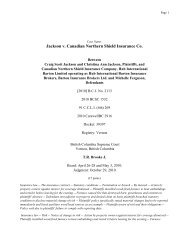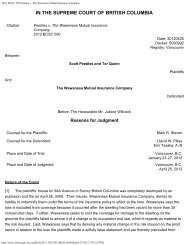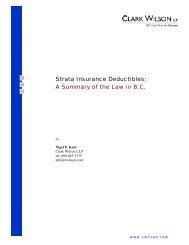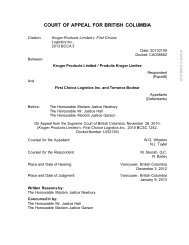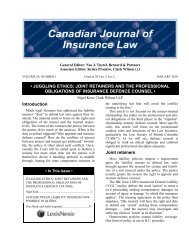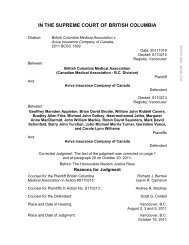juggling ethics: joint retainers and the ... - Clark Wilson LLP
juggling ethics: joint retainers and the ... - Clark Wilson LLP
juggling ethics: joint retainers and the ... - Clark Wilson LLP
You also want an ePaper? Increase the reach of your titles
YUMPU automatically turns print PDFs into web optimized ePapers that Google loves.
p. 2<br />
to defend any “action” seeking those compensatory damages … [<strong>and</strong> <strong>the</strong> insurer] may investigate <strong>and</strong><br />
settle any claim or “action” at its discretion”.<br />
Homeowners policies extend liability coverage. One form of policy in use in B.C. provides:<br />
“Defence of lawsuits: [<strong>the</strong> insurer] will defend any action against [<strong>the</strong> insured] claiming<br />
compensatory damages on account of legal liability insured by this policy. [The insurer] will<br />
defend any such action even if it is completely groundless. [The insurer] reserves <strong>the</strong> exclusive<br />
right to appoint <strong>and</strong> instruct legal counsel in <strong>the</strong> defence <strong>and</strong> settlement of any such action as<br />
[<strong>the</strong> insurer] in [its] absolute discretion considers appropriate”.<br />
In British Columbia, that Province’s plan of universal compulsory vehicle insurance is operated by ICBC<br />
pursuant to <strong>the</strong> Insurance (Vehicle) Act, R.S.B.C. 1996, c. 231 as amended <strong>and</strong> <strong>the</strong> Insurance (Vehicle)<br />
Regulation, B.C. Reg. 447/83. Sections 74 <strong>and</strong> 74.1 of <strong>the</strong> Regulation address <strong>the</strong> defence of claims<br />
arising out of motor vehicle accidents:<br />
“74. … <strong>the</strong> Corporation, at its expense, shall<br />
(a)<br />
assist <strong>the</strong> insured by investigating <strong>and</strong> negotiating a settlement where, in <strong>the</strong><br />
Corporation’s opinion its assistance is necessary, <strong>and</strong><br />
(b) … defend in <strong>the</strong> name of <strong>the</strong> insured any action for damages brought against <strong>the</strong><br />
insured<br />
74.1 … on assuming <strong>the</strong> defence of an action for damages brought against an insured, <strong>the</strong><br />
Corporation shall have exclusive conduct <strong>and</strong> control of <strong>the</strong> defence of <strong>the</strong> action <strong>and</strong>, without<br />
limiting <strong>the</strong> generality of <strong>the</strong> foregoing, <strong>the</strong> Corporation shall be entitled<br />
(a)<br />
(b)<br />
(c)<br />
appoint <strong>and</strong> instruct counsel to defend <strong>the</strong> action,<br />
admit liability, in whole or in part, on behalf of <strong>the</strong> insured …<br />
compromise or settle <strong>the</strong> action.”<br />
These insurance policy provisions contemplate that <strong>the</strong> insurer will appoint a lawyer to defend <strong>the</strong><br />
insured <strong>and</strong> also, to varying degrees, purport to vest <strong>the</strong> insurer with <strong>the</strong> authority to instruct that<br />
lawyer to h<strong>and</strong>le <strong>the</strong> claim as <strong>the</strong> insurer wishes. So clearly, <strong>the</strong> insured, <strong>the</strong> very person whom <strong>the</strong><br />
lawyer is representing in <strong>the</strong> law suit, becomes a client of that lawyer. Is <strong>the</strong> insurance company, <strong>the</strong><br />
one that appoints, pays <strong>and</strong> instructs <strong>the</strong> lawyer, also a client?<br />
There is one Canadian case, widely considered by <strong>the</strong> insurance bar to be wrongly decided on this point,<br />
which has held that insurer–appointed defence counsel has only one client, namely, <strong>the</strong> insured. In<br />
Hopkins v. Wellington, [1999] BCJ No. 1164 (SC), <strong>the</strong> Court declared “<strong>the</strong> only client is <strong>the</strong> insured even<br />
though <strong>the</strong> insured has, by virtue of <strong>the</strong> contract of insurance, delegated <strong>the</strong> choice of his or her counsel<br />
to <strong>the</strong> insurer”. 2 The Court expressed disapproval of <strong>the</strong> notion that “defence counsel is also acting on<br />
behalf of <strong>the</strong> insurer <strong>and</strong> has a duty to protect <strong>the</strong> insurer’s interests” <strong>and</strong> went on, to observe:<br />
2 para. 9<br />
© 2009 <strong>Clark</strong> <strong>Wilson</strong> <strong>LLP</strong> cwilson.com<br />
Nigel P. Kent, T. 604.643‐3135.




